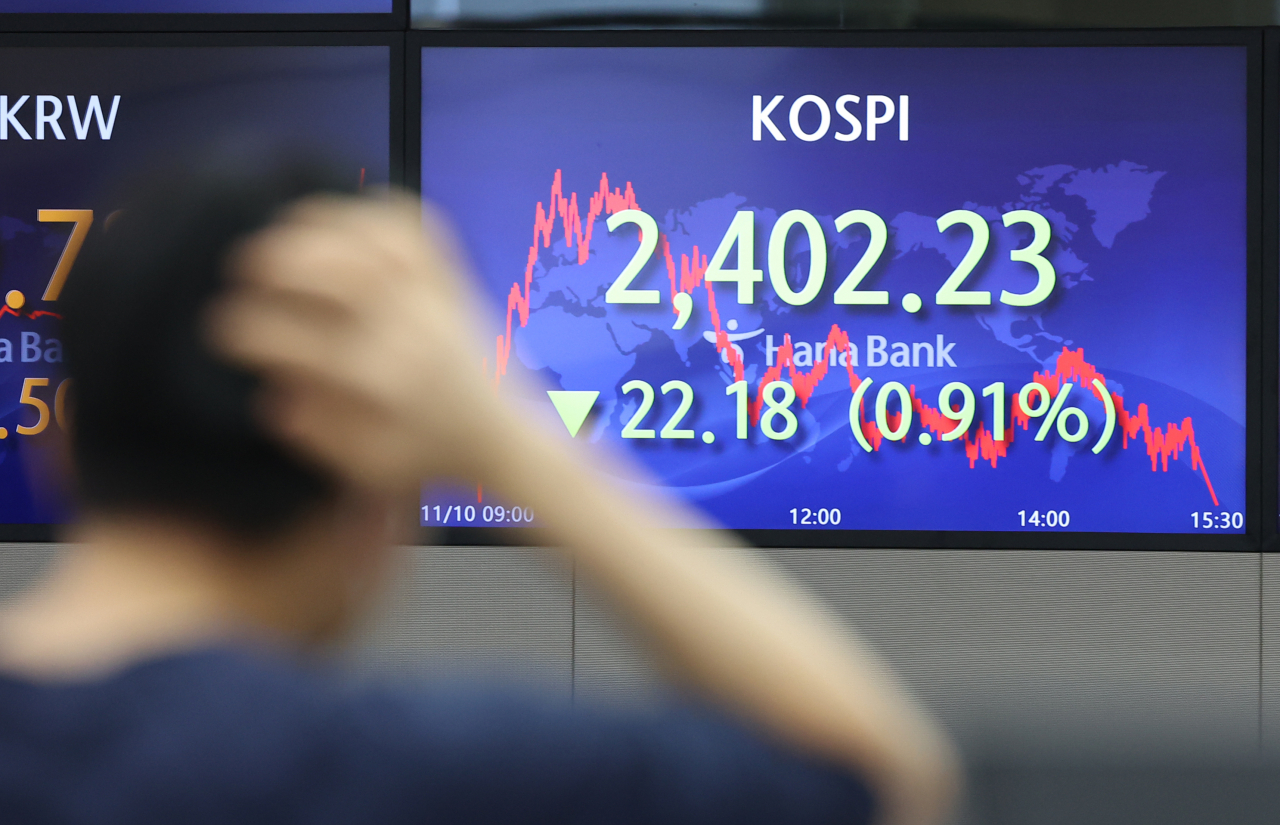New stock tax plan puts retail investors on edge
Opposition-envisioned tax scheme targets top 1 percent of retail investors, but fear is widespread
By Park Han-naPublished : Nov. 12, 2022 - 16:01

The main opposition Democratic Party of Korea’s push to introduce a new tax on stocks from next year is causing concern among retail investors who fear it could further dampen investor sentiment in the local equity market.
The envisioned scheme is to levy a capital gains tax of 22 to 27.5 percent on income a retail investor makes from financial investments such as share or bond sales, if it is above the set threshold.
The plan won bipartisan support in the parliament in 2020 under the previous Moon Jae-in administration and was scheduled to go into effect next year.
But with the change of government and markets turning bearish amid global recession fears, the Finance Ministry and the ruling People Power Party want it to be delayed by two years. Canceling the 2023 introduction of the new tax was one of President Yoon Suk-yeol’s election pledges.
The opposition DP, which controls an absolute majority of the unicameral National Assembly, however, is refusing to budge.
On Nov. 10, DP members of the parliament’s Strategy and Finance Committee released a joint statement that the tax should be introduced from Jan. 1 as originally planned, asserting that “there should be tax where earning incurs.”
Under the party’s proposal, retail investors with annual profits exceeding 300 million won ($226,557) will be taxed 27.5 percent. Those with a taxable income between 50 million won and 300 million won will be applied a tax rate of between 22-27.5 percent.
The Finance Ministry expressed concern that the move could increase market volatility.
“It would remove tax advantages of domestic listed stocks, which may accelerate capital outflow to overseas stocks and adversely affect the foreign exchange rate,” the ministry’s tax policy chief Ko Kwang-hyo said during a debate session held at the National Assembly on Nov. 7.
Ko’s remarks echoed the sentiment among retail investors on the proposal.
They fear the change will pour cold water to the fragile Kospi, the country’s benchmark bourse which has dipped 20 percent since the begining of the year. Tech-loaded KOSDAQ declined over 30 percent.
A petition for the capital gains tax deferral, posted on Oct. 12 on the bulletin board of the National Assembly, has garnered the consent of more than 50,000 people so far.
“The tax will only affect individual investors, not foreign investors or institutional investors,” the petition reads.
Rep. Kweon Seong-dong of the ruling party warned the local stock market could crash if big players in the market look elsewhere for investment to avoid the new tax.
“In the end, the damage will also be suffered by small investors, who make up the majority of 14 million people. … If the stock price plummets, it’s not going to be possible to collect the expected tax revenue,” he wrote on his Facebook.
DP lawmakers say the ruling camp is fearmongering to delay the capital gains tax, which applies to only a handful who make large profits, as if it is to affect all retail investors. The current administration is intent on giving tax breaks to the rich, they say.
Citing data from the Korea Financial Investment Association from five local securities firms, the party claims that the capital gains tax proposal on stock investment will affect only 1 percent of all stock investors.
The proportion of investors who earned more than 50 million won was only 0.9 percent between 2019 and 2021. Even in 2020 when it was a bullish market, investors who made over 50 million won accounted for 1.2 percent, the data shows.







![[Graphic News] More Koreans say they plan long-distance trips this year](http://res.heraldm.com/phpwas/restmb_idxmake.php?idx=644&simg=/content/image/2024/04/17/20240417050828_0.gif&u=)
![[KH Explains] Hyundai's full hybrid edge to pay off amid slow transition to pure EVs](http://res.heraldm.com/phpwas/restmb_idxmake.php?idx=644&simg=/content/image/2024/04/18/20240418050645_0.jpg&u=20240419100350)






![[From the Scene] Monks, Buddhists hail return of remains of Buddhas](http://res.heraldm.com/phpwas/restmb_idxmake.php?idx=652&simg=/content/image/2024/04/19/20240419050617_0.jpg&u=20240419175937)

![[KH Explains] Hyundai's full hybrid edge to pay off amid slow transition to pure EVs](http://res.heraldm.com/phpwas/restmb_idxmake.php?idx=652&simg=/content/image/2024/04/18/20240418050645_0.jpg&u=20240419100350)

![[Today’s K-pop] Illit drops debut single remix](http://res.heraldm.com/phpwas/restmb_idxmake.php?idx=642&simg=/content/image/2024/04/19/20240419050612_0.jpg&u=)